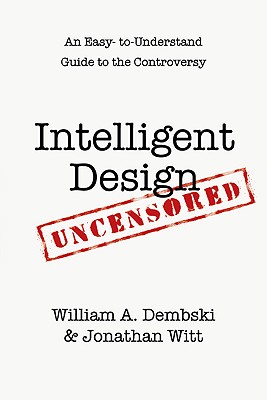
Uncensoring and Simplifying the Scientific Case for Intelligent DesignCasey Luskin  Intelligent Design Uncensored: An Easy-to-Understand Guide to the Controversy is a book I've long hoped that someone would write. Don't get me wrong -- there are other good books out there that explain the fundamentals of intelligent design (ID) in plain language. But with clarity, elegance, and accuracy, Intelligent Design Uncensored fills this niche better than most. The authors, Dr. William Dembski (an expert in the technical arguments for ID) and Dr. Jonathan Witt (a writer with a strong grasp of the relevant science) -- both Discovery Institute senior fellows -- make an ideal team. Intelligent Design Uncensored: An Easy-to-Understand Guide to the Controversy is a book I've long hoped that someone would write. Don't get me wrong -- there are other good books out there that explain the fundamentals of intelligent design (ID) in plain language. But with clarity, elegance, and accuracy, Intelligent Design Uncensored fills this niche better than most. The authors, Dr. William Dembski (an expert in the technical arguments for ID) and Dr. Jonathan Witt (a writer with a strong grasp of the relevant science) -- both Discovery Institute senior fellows -- make an ideal team.
After taking the reader on a tour of molecular machines and cellular complexity, Dembski and Witt condense the scientific thinking behind the design inference into "easy-to-understand" terms, just as advertised: (William Dembski and Jonathan Witt, Intelligent Design Uncensored: An Easy-to-Understand Guide to the Controversy, p. 53 (InterVarsity Press, 2010).) Does this explanation deserve our credence? Not if, in other contexts, we don't observe blind and unguided processes spontaneously re-organizing parts into machines. Dembski's technical expertise and Witt's masterly prose shine through in a knockdown argument against co-option: "What is the one thing in our experience that co-opts irreducibly complex machines and uses their parts to build a new and more intricate machine? Intelligent agents." (p. 54) In addition to summarizing the case for design, ID Uncensored also contributes to ID thinking. For example, it explains how Dembski's method of detecting design using the explanatory filter, and Stephen Meyer's method of using an argument from our positive uniform experience, combine in pointing to design: (William Dembski and Jonathan Witt, Intelligent Design Uncensored: An Easy-to-Understand Guide to the Controversy, p. 90 (InterVarsity Press, 2010).) I often get e-mails from people making vague appeals to vast eons of time and vast unseen probabilistic resources in the universe to claim that the naturalistic origin of life's complexity is possible. ID proponents have responded by noting that we should not assume that the material causes have the ability to produce life. Instead, we should treat that hypothesis scientifically and test it. As a result, ID proponents have often discussed a complicated technical concept called the "universal probability bound," which is basically a measure of the probabilistic resources available over the history of the universe. In books including No Free Lunch, Dembski has elsewhere given technical explanations for his conservative calculation of the universal probability bound. Jonathan Witt now translates what was daunting scientific language in remarkably lucid prose: This means that any specified event whose probability is less than 1 chance in 10150 will remain improbable even if we let every corner and every moment of the universe roll the proverbial dice. The universe isn't big enough, fast enough or old enough to roll the dice enough times to have a realistic chance of randomly generating specified events that are this improbable. (William Dembski and Jonathan Witt, Intelligent Design Uncensored: An Easy-to-Understand Guide to the Controversy, pp. 68-69 (InterVarsity Press, 2010).) But ID Uncensored doesn't stop at explaining the science -- it also delves into the respective sociological and theological implications of Darwinism and ID. Aware of common fallacious objections to ID, Dembski and Witt explain why broaching these topics does not imply that Darwinism or ID isn't science: "Another argument Darwinists sometimes use is to assert that ID isn't science because it has religious, philosophical, and political implications. The problem is that this standard also disqualifies Darwinism." (p. 38) Instead, they take the higher road, acknowledging that both Darwinism and ID are legitimate scientific projects: "Although Darwinism and intelligent design are both based on physical evidence and standard methods of scientific reasoning, both have profound implications beyond science." (p. 95) What's revealing about their chapter on theology is that it doesn't try to argue affirmatively for design. Rather, it focuses on addressing theological objections to ID, blowing them out-of-the-water by exposing logical fallacies and self-contradictory logic. But the interesting point is this: Increasingly we see critics of ID arguing on the basis not of science but of theology. As I observed recently, this is amusing since ID's opponents are "openly and unashamedly letting theology stand in the way of scientific investigation--the very charge they constantly levy against [proponents of] ID." One charge that won't stick against Intelligent Design Uncensored is that it's unclear. This makes the book all the more important, as it will undoubtedly fall into the hands of many students who will quickly find answers to many of the most common objections to ID they are being taught by their largely uninformed professors. This book would make a great graduation present. Yet it is a book for any reader -- student or otherwise -- who seeks a compelling, accurate, accessible case for intelligent design. It closes with a variety of tips and helpful pieces of advice for anyone seeking to make an impact on this debate. This makes Intelligent Design Uncensored a welcome and badly needed contribution to the literature of ID. Whether you're an ID-guru or an ID-newbie, you will learn something and gain insight from reading this book. |